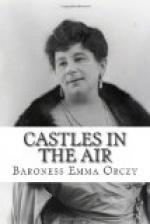But this eventuality leaves me cold. He has only himself to thank for his misfortune. Everything would have gone well but for his treachery. We would have become affluent, he and I and Theodore. Theodore has gone to live with his mother, who has a fish-stall in the Halles; she gives him three sous a day for washing down the stall and selling the fish when it has become too odorous for the ordinary customers.
And he might have had five hundred francs for himself and remained my confidential clerk.
CHAPTER IV
CARISSIMO
1.
You must not think for a moment, my dear Sir, that I was ever actually deceived in Theodore. Was it likely that I, who am by temperament and habit accustomed to read human visages like a book, was it likely, I say, that I would fail to see craftiness in those pale, shifty eyes, deceit in the weak, slobbering mouth, intemperance in the whole aspect of the shrunken, slouchy figure which I had, for my subsequent sorrow, so generously rescued from starvation?
Generous? I was more than generous to him. They say that the poor are the friends of the poor, and I told you how poor we were in those days! Ah! but poor! my dear Sir, you have no conception! Meat in Paris in the autumn of 1816 was 24 francs the kilo, and milk 1 franc the quarter litre, not to mention eggs and butter, which were delicacies far beyond the reach of cultured, well-born people like myself.
And yet throughout that trying year I fed Theodore—yes, I fed him. He used to share onion pie with me whenever I partook of it, and he had haricot soup every day, into which I allowed him to boil the skins of all the sausages and the luscious bones of all the cutlets of which I happened to partake. Then think what he cost me in drink! Never could I leave a half or quarter bottle of wine but he would finish it; his impudent fingers made light of every lock and key. I dared not allow as much as a sou to rest in the pocket of my coat but he would ferret it out the moment I hung the coat up in the outer room and my back was turned for a few seconds. After a while I was forced—yes, I, Sir, who have spoken on terms of equality with kings—I was forced to go out and make my own purchases in the neighbouring provision shops. And why? Because if I sent Theodore and gave him a few sous wherewith to make these purchases, he would spend the money at the nearest cabaret in getting drunk on absinthe.




